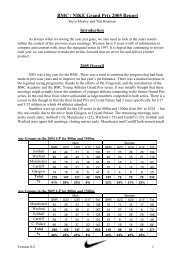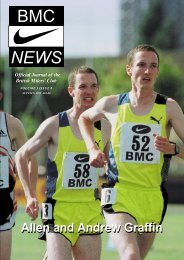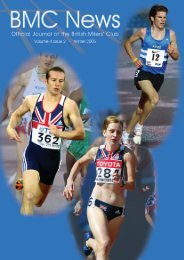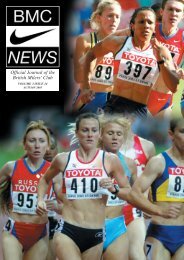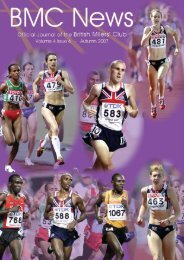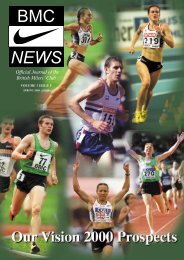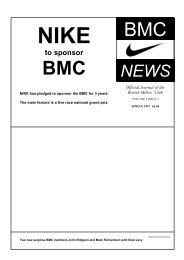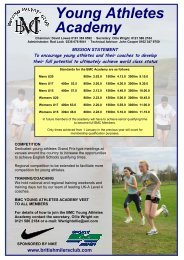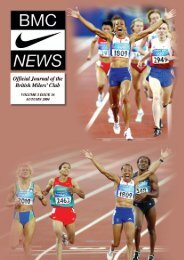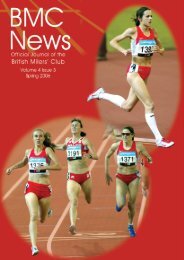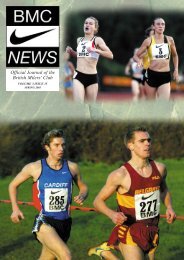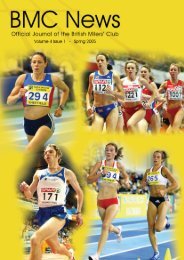Create successful ePaper yourself
Turn your PDF publications into a flip-book with our unique Google optimized e-Paper software.
BMC April <strong>1999</strong> 6/6/99 9:07 pm Page 18IAAF Code of Ethics for CoachesThe coach’s primary role is to facilitate the process of individual developmentthrough achievement of Athletic potential. This role accepts the athletes’ longterm interests as of greater importance than short term athletic considerations.To fulfil this role the coach must behave in an ethical manner respecting thefollowing points:❒Coaches must respect the basichuman rights, that is the equalrights, of each athlete with nodiscrimination on the grounds of gender,race, colour, language, religion, politicalor other opinion, national or social origin,association with a national minority, birthor other status.❒Coaches must respect the dignity andrecognise the contribution of eachindividual. This includes respecting theright for freedom from physical or sexualharassment and advances.❒Coaches must ensure that thepractical environments are safe andappropriate. This appropriateness musttake into consideration the age, maturityand skill level of the athlete. This isparticularly important in the case ofyounger or less developed athletes.❒Coaches must acknowledge andrespect the Rules of Competition.This respect should extend to the spirit aswell as to the letter of the rules, in bothtraining and competition, to ensurefairness of competitive opportunitybetween all athletes.❒Coaches must exhibit an activerespect for officials, by accepting therole of the officials in providing judgementto ensure that competitions are conductedfairly and according to the establishedrules.❒Coaches have a responsibility toinfluence the performance andconduct of the athletes they coach, while atthe same time encouraging theindependence and self determination ofeach athlete by their acceptance ofresponsibility for their own decisions,conduct and performance.❒Coaches must assert a positive andactive leadership role to prevent anyuse of prohibited drugs or otherdisallowed performance enhancingsubstances or practices. This leadershipby coaches includes education of theathletes of the harmful effects of prohibitedsubstances and practices.❒The coach must acknowledge that allcoaches have an equal right todesire the success of the athletes theycoach - competing within the rules.Observations, recommendations andcriticism should be directed to theappropriate person outside the view orhearing of the public domain.❒Coaches should never solicit, eitherovertly or covertly, athletes who arereceiving coaching to join their squad.❒Coaches should hold recognisedcoaching qualifications. Coachesshould respect that the gaining of coachingqualifications is an ongoing commitment,achieved through the upgrading of theirknowledge by attendance of accreditedcourses and through practical coachingexperience. Coaches also have aresponsibility to share the knowledge andpractical experience they gain.❒Coaches must respect the image ofthe coach and continuously maintainthe highest standards of personal conduct,reflected in both the manner of appearanceand behaviour.❒Coaches should never smoke whilecoaching, nor consume alcoholicbeverages so soon before coaching that itaffects their competence or that the smellof alcohol is on their breath.❒Coaches should enter into fullcooperation with all individuals andagencies that could play a role in thedevelopment of the athletes they coach.This includes working openly with othercoaches, using the expertise of sportsscientists and sports physicians anddisplaying an active support of theirNational Federation and the I.A.A.F..©I.A.A.F. 199618BMC News : <strong>Spring</strong> <strong>1999</strong>



